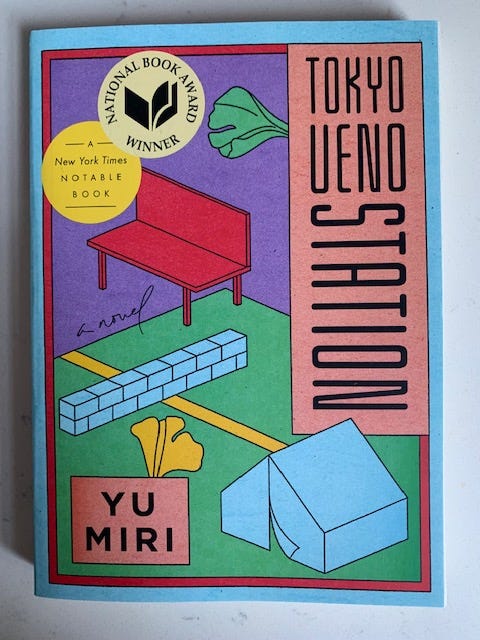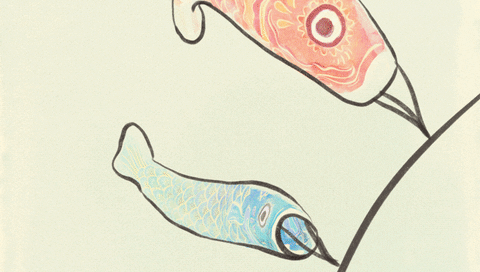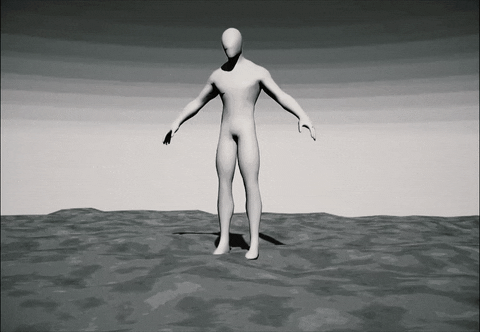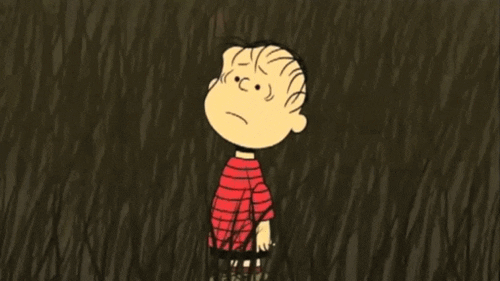'Tokyo Ueno Station' by Yu Miri
'We were always on edge, dogged by danger and the anxiety that if we had something even for a moment, it could be taken away.'—Review #171
Hope you are all enjoying leaf-peeping and decorative-gourd season. Before we begin, I want to thank everyone who hit the ♥️ button on our ‘Dune’ review two weeks ago. It is now Books on GIF’s most ♥️-ed newsletter, edging out Myriam Gurba’s ‘Mean’, which held the top spot for more than a year. Your positive feedback was the high note to an otherwise stressful week. It started with our cat, Lola, in the emergency room with a kidney issue. She is on the mend with a new diet and medication, but things didn’t look good. At the same time, I was reading Yu Miri’s ‘Tokyo Ueno Station,’ an emotional bulldozer of a novel that explores death, grief and life’s futility. Things get grim below, so, in case you need something happy to scroll back to, here is a GIF of a small dog playing with a tiny pumpkin:
OK, let’s proceed.
Here’s the cover:

‘Tokyo Ueno Station’ won the 2020 National Book Award for translated literature. Its protagonist is Kazu, and he is dead. His spirit roams Tokyo’s Ueno Park, which contains, in addition to its natural features, various museums, statues and cultural institutions, a train station and several homeless encampments. Kazu had been living in one of the encampments before he died, and now, in his invisible form, he catches snippets of people’s conversations, lingers by monuments (like the Statue of Times Forgotten, a memorial to people killed in World War II’s firebombing of Tokyo) and recounts memories of his hard-luck life. The narrative seamlessly moves from a woman talking about rushing home to make dinner to how terrified people tried to flee the flames caused by American bombs to how Kazu worked construction and other manual labor jobs to make ends meet amid grinding poverty in post-war Japan from the 1940s to the Fukushima tsunami in 2011. The story is surreal, but coherent, and we see Kazu barely hanging on as he’s pummeled by life, like a wind sock whipped by relentless gusts:
As a young man, Kazu takes jobs far from home to support his wife, daughter and son. He helps build baseball stadiums and venues for the 1964 Tokyo Olympics. While he’s off working and sending money home, his children grow up without him. Unexpectedly, his 21-year-old son, who seemed primed for a stable and successful career, dies in his sleep. At the funeral when his son is eulogized by friends Kazu has never seen before, they describe experiences he had never heard about. Kazu’s spirit is broken by the knowledge that he never got to know his son, and any chance for them to reconnect is lost. I felt terrible for him. I was like:

Kazu never fully recovers, and his loneliness and grief are compounded over the years by additional tragedies and old age. One day he leaves home, where his granddaughter had been taking care him, to join the homeless in Ueno Park and:
‘Tokyo Ueno Station’ depressed me, and I dreaded revisiting it here. Even so, it’s an excellent book with a vital message. Miri reminds us that every moment with our loved ones is precious because death can strike suddenly at any time. She also reminds us that work can grind us down, distract us from our personal connections and take away much of the joy in life. A lot has been made in the news recently of people quitting their jobs and seeking better work-life balance post-pandemic. But as I read Miri’s book, it struck me that this struggle is a privilege largely unavailable to people without means. Her novel is a sobering reminder to take nothing for granted, to hug your family and friends, and your pets, and to spend as much time as possible with them. ‘Tokyo Ueno Station’ is brilliantly constructed and beautifully written. If you’ve got the emotional strength, you should read it.
How it begins:
There’s that sound again.
That sound—
I hear it. But I don’t know if it’s in my ears or in my mind.
I don’t know if it’s inside me or outside.
I don’t know when it was or who it was either.
Is that important?
Was it?
Who was it?
I used to think life was like a book: you turn the first page, and there’s the next, and as you go on turning page after page, eventually you reach the last one. But life is nothing like a story in a book. There may be words, and the pages may be numbered, but there is no plot. There may be an ending, but there is no end.
My rating:
‘Tokyo Ueno Station’ (‘JR Ueno-eki Koen-guchi) by Yu Miri was originally published in Japan by Kawade Shobò Shinsha in 2014. It was translated from the Japanese by Morgan Giles and published in Great Britain by Tilted Axis Press in 2019. It was first published in the United States by Riverhead Books in 2020. 180 pages. $14.72 at Bookshop.org.
Let’s discuss:
What’s the most depressing book you’ve ever read? What did you learn from it?
What’s next:
Before you go:
ICYMI: Review #170:
Watch this: The New York Review of Books posted a one-star review of BoG fave ‘The Dud Avocado’ by Elaine Dundy on TikTok. It’s funny, and actually makes the book sound even better than it already is:

In Memoriam: Bill Burke, a former boss and colleague when I was starting my career, died suddenly last week. Bill was a wonderful guy, always upbeat and positive, and he was the author of travelogues about Disney vacations. Though I hadn’t spoken to him in years, we were connected on Instagram, and he seemed to be as warm and full of life as I remembered. I was saddened to hear of his passing, and we send our deepest condolences to his family and friends. Bill will be missed.
Thanks for reading, and thanks especially to Donna for editing this newsletter!
Until next time,
MPV














I liked your review. The book looks promising to explore. I have included this to my TBR. But at my age( 77) whether I would able to fulfill my promise. My only resource is digital library. Thanks anyway.
The most depressing books I have read are Frank McCourt’s ”Angela’s Ashes” and “The Glass Castle” by Jeannette Walls. Memoirs or stories where a family member drinks up all the money while their kids literally starve…I just can’t.